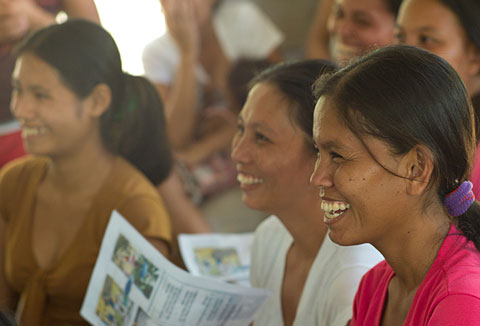Peru: The Power of Citizens
Engaged and mobilised citizens can change the world we live in: four examples from Peru.

African and German experts met in Berlin to exchange ideas on issues surrounding the digitalisation of Africa.
Berlin. “The digital divide is not a mantra”, noted Rwandan Internet Minister H.E. Jean Philbert Nsengimana in his opening address at the “Africa: Continent of Opportunities - Bridging the Digital Divide” conference held in Berlin on May 11, 2015. The Minister described digitalization instead as a magnet that attracted talent and promoted investment and education. As such, it increased prosperity, which would in turn automatically reduce the digital divide. Still, he added, governments could not simply sit on their hands and wait – an idea that resonated with all conference participants. States play an important role in digitalization and the question of “how” and especially “how much” to regulate was a central question explored at the conference.
The Federal Ministry for Economic Cooperation and Development (BMZ) invited young entrepreneurs, bloggers and Internet experts from Africa to Berlin – and encouraged exchange with DC experts from Germany.
Along with German Commissioner for Africa, Günter Nooke, State Secretary Dr Friedrich Kitschelt also spoke at the conference opening. “Digitalisation is not optional”, Kitschelt said, emphasising the innovative potential of the technical sector in young economies like Kenya, Ruanda and others.
The State Secretary voiced his confidence that trends like “the Internet of Things” (an internet embedded in a wide range of devices and clothing that helps users almost imperceptibly) and the “sharing economy” (the sharing of material and non-material goods) will change the social fabric of our lives considerably. The BMZ, he continued, therefore felt it was very important to push digital issues to the forefront of discussion, and so he was introducing the new BMZ strategic partnership for a digital Africa.
Rwandan Internet Minister Nsengimana listed 10 steps Rwanda – generally considered a paradigm of digitization – had taken to realise its ambitious goals and was still currently implementing (for these 10 steps see the event blog, link below). The Minister’s core message: “Visions are hard, implementations are harder” was met with widespread agreement from the audience.
Two aspects of the “digital divide” were explored in a podium discussion and a workshop: the gap between the city and the country and between the well-educated and the uneducated. An additional podium discussion addressed the risks and opportunities of the “digital economy”.
Participants were mostly in agreement that while expanding infrastructure (fibre-optic cable etc.) and electrification were important, states needed to look much further up the road. Education at all levels of society, the development of inexpensive and efficient consumer devices, promoting local services and initiatives in particular, and being open to innovative ideas were just some of the aspects brought up again and again. There were many different views of the government’s role – clearly an area with great scope for further discussion.
It became clear that the basic attitude – of entrepreneurs and governments alike – was of great interest. Participants agreed that a “mind-set” was needed, one that was open, courageous and allowed for failure. One that focused on opportunity and not risk. Or, as Juliet Wanyiri, founder of Foondi in Kenya, put it: “Stop looking at tech and innovation in Africa as something fragile! What we need is more optimism!”
The event was organised by the GIZ’s Development Policy Forum with support from the Information and Communications Technology for Sustainable Development and the Digital World Sectoral Project. A live blog reported on the event and consolidated the most important Tweets. At times the #bmzafrika hashtag was third in trending topics on Twitter Deutschland.
Photo: GIZ/Thomas Ecke

The life of the politically powerful tends often to isolation and loneliness. But nevertheless, many politicians still aspire to this life.

How social innovation is pioneering a new reality for women across the Middle East and North Africa.